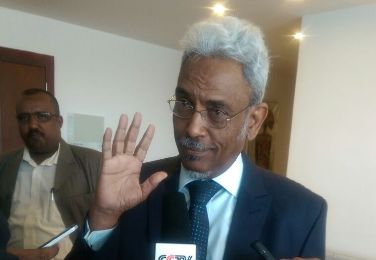Sudan urges opposition groups to sign Roadmap Agreement
March 25, 2016 (KHARTOUM) – The head of Darfur peace office Amin Hassan Omer has called on the opposition forces to listen to the voice of reason and sign the Roadmap Agreement before the end of the ultimatum given by the African Union to that effect.

However, the opposition groups, Justice and Equality Movement, National Umma Party (NUP), Sudan People’s Liberation Movement -North (SPLM-N), and Sudan Liberation Movement-Minni Minnawi (SLM-MM) refused the roadmap saying it would lead to reproduce the regime.
On Wednesday, the head of the African Union Commission Nkosazana Dlamini Zuma, welcomed the signing of the Roadmap Agreement by the Sudanese government and urged the opposition groups to sign it within five days.
Omer, who is also the government chief negotiator for the Darfur track, pointed that the Roadmap Agreement provides that the dialogue must be held inside Sudan. He further said the holdout opposition will join the dialogue’s six sub-committees according to what they would agree upon with the dialogue body known as 7+7.
He told the semi-official Sudan Media Center (SMC) that the government separates between the two tracks of negotiations, pointing the roadmap has explained how the dialogue should be conducted.
Omer added the roadmap addressed the major issues that would enable the parties to arrive at a common understanding on how to tackle the peace and dialogue files properly.
The government official stressed that no dialogue would be held other than the ongoing internal dialogue which is being conducted under the direction of the high coordination committee headed by President Omer al-Bashir.
The opposition groups said that this roadmap not only disagrees with the previous roadmap endorsed by the African Union Peace and Security Council (AUPSC) but it legitimizes the ongoing dialogue process which is entirely controlled by the ruling National Congress Party.
However, AUHIP chief, Thabo Mbeki, insisted on the need to stop war and to open humanitarian assistance to the civilians in the war affected areas.
The AUPSC is expected to endorse the agreement and demand to the UN Security Council to support it and approves it as a basis for a comprehensive political solution in Sudan.
